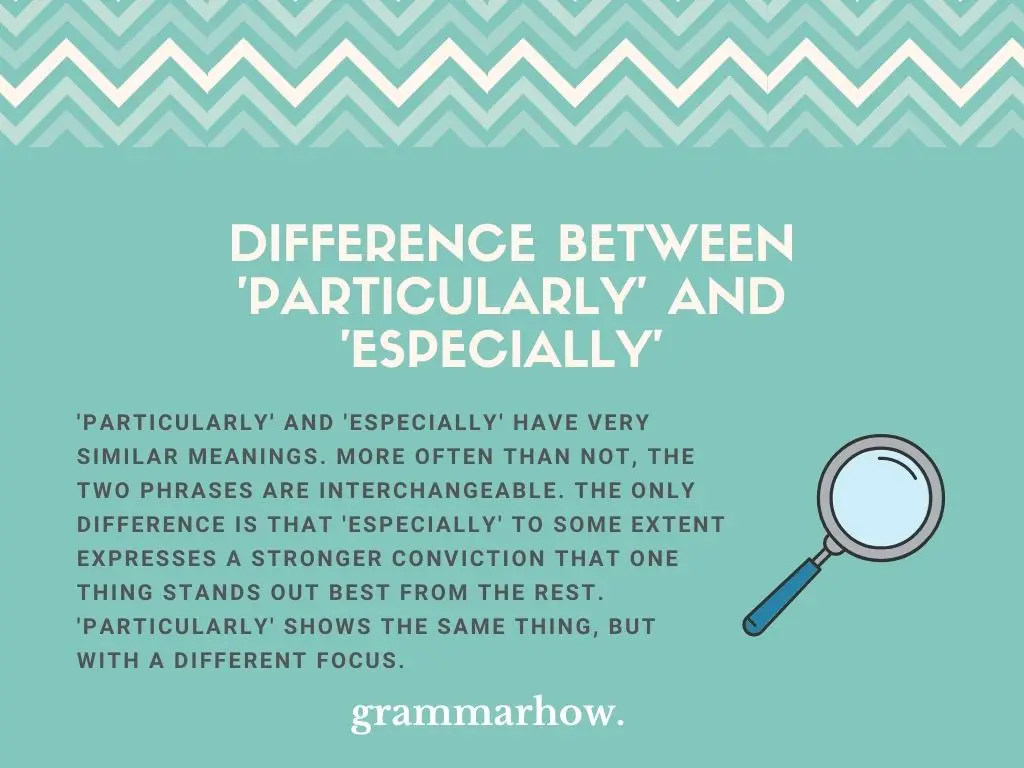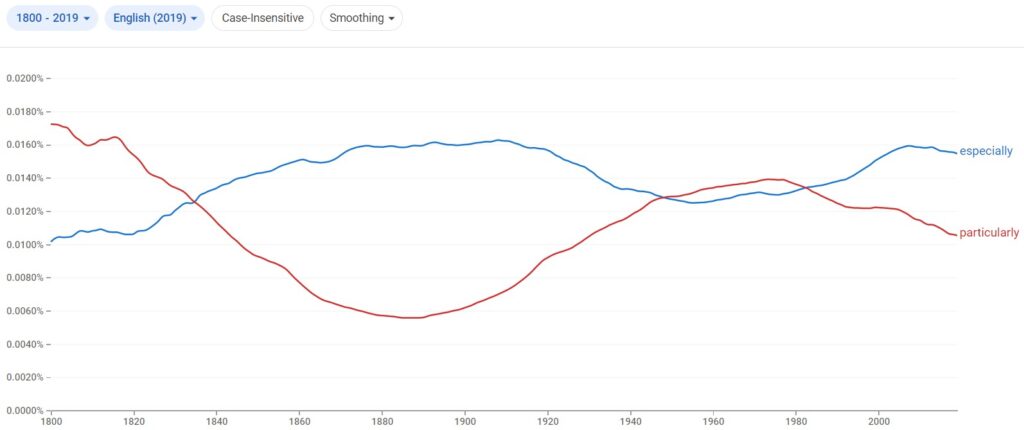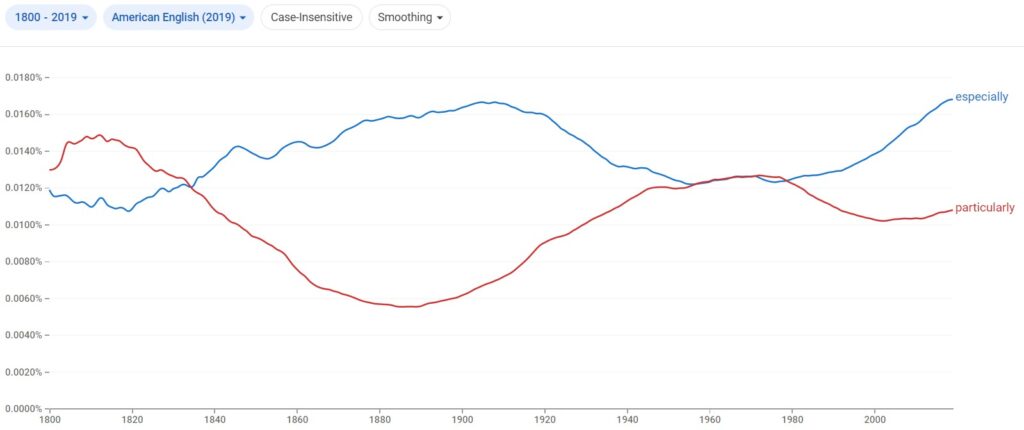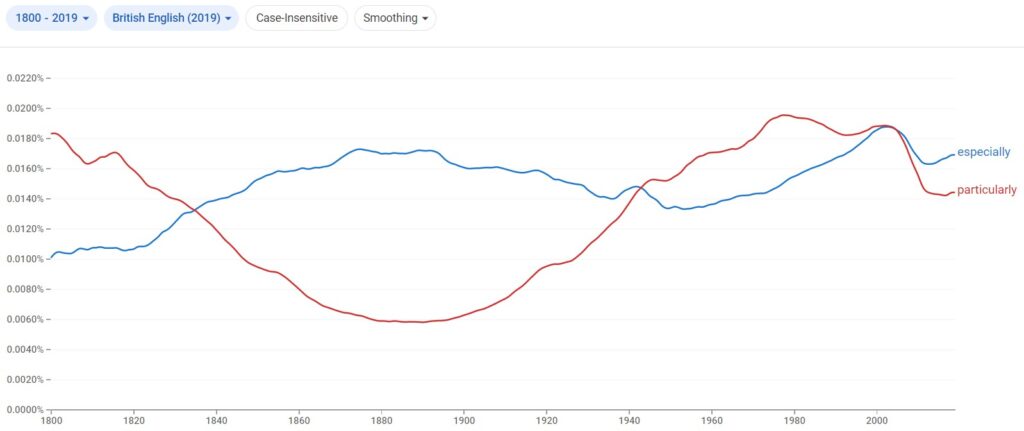With the vast nature of the English language, it’s no surprise that some words overlap in meaning. While no two words are the same, it may be puzzling to identify what word is most appropriate to use in a given situation. Like, is it ‘especially’ or particularly?’ Let’s see!
What Is The Difference Between ‘Particularly’ And ‘Especially?’
‘Particularly’ and ‘especially’ have very similar meanings. More often than not, the two phrases are interchangeable. The only difference is that ‘especially’ to some extent expresses a stronger conviction that one thing stands out best from the rest. ‘Particularly’ shows the same thing, but with a different focus.

We use ‘particularly’ mainly to differentiate something from a particular group of things. It’s to point out a characteristic of something that stands out from the rest. On the other hand, we use ‘especially’ when we want to emphasize levels or rankings more. It means differentiating something as higher over all other things.
What Does ‘Particularly’ Mean?
We use ‘particularly’ as an adverb to point out something that stands out from the rest. It’s a way to emphasize a unique characteristic of something different from the other things in the same category. It could also mean something of a higher degree than other things.
According to the Cambridge Dictionary, ‘particularly’ also means ‘very or very much; especially; or more than usual.’
Below are examples of how we can use ‘particularly’ in a sentence.
- Maya was a brilliant student, particularly in Science. She always aces all the tests and tasks. I’m envious of her because I’m not good at Science.
- We’re particularly interested in hearing how you plan to uphold environmental protection and sustainability in the launch and operations of your business.
- I like all kinds of seafood, but I particularly like crabs. I think crab meat is excellent in every way, from its texture to taste.
- I’m very unsure of our project. I particularly don’t like how no one is cooperating with me. So, I can’t move on with the project because my groupmates aren’t helping at all.
- I can eat fresh strawberries, but I particularly hate artificial strawberry flavoring. Something about the way it tastes doesn’t sit right with me.
- I’m particularly fond of Maltese puppies. I also have two Maltese dogs at home, so every time I see a Maltese, the dog reminds me of my pets.
- I will be reviewing your paper later. Particularly, I’ll pay more attention to the writing style you have employed and whether it is effective or not.
What Does ‘Especially’ Mean?
‘Especially’ is an adverb we use to differentiate something from a group of other things. ‘Especially’ usually conveys more conviction and emphasis on the ranking–of something being superior or more than the others or the standard or usual. Others also perceive it as less formal and more conversational than ‘particularly.’
According to the Cambridge Dictionary, ‘especially’ means ‘very much; more than usual or more than other people or things; or for a particular reason.’ It is also ‘used to emphasize the importance of one thing among others of its type or to point to one thing among others; very; particularly.’
Below are examples of how we use ‘especially’ in a sentence.
- I like all ball sports, but I especially like basketball. Basketball was the first sport I ever learned through my dad’s lessons.
- Especially for developing nations, there needs to be togetherness and more support for developed countries for the nations to grow and better.
- Bree is especially fond of his younger brother, that is only three years old. Bree adores how cute her brother looks even when he’s not doing anything.
- We might have to go with a digital event instead, especially since the attendees’ health might be at risk.
- I didn’t think I’d be above average in all subjects, especially in Math, since I forgot to study for it and I failed a test.
- Leaders need to take more accountability and responsibility when handling issues. Especially for world and nation leaders, accountability is essential, and we need to see it more in today’s world.
- I’m fond of all colors, but I especially like yellow recently. I love the bright and joyful energy the color radiates.
Are ‘Especially’ And ‘Particularly’ Interchangeable?
‘Especially’ and ‘particularly’ are interchangeable. According to the Cambridge Dictionary, ‘especially’ means ‘particularly,’ and ‘particularly’ means ‘especially.’ Because they have similar meanings, we can conclude that the two phrases are interchangeable, most often than not. Though, there could still be a most appropriate word to use given the context.
While being almost identical and interchangeable, many argue that ‘especially’ is less formal and more conversational, while ‘particularly’ expresses something more formal and academic. Despite being so, you can freely interchange the phrases to fit the context of what you’re writing or speaking.
Is ‘Especially’ Or ‘Particularly’ Used The Most?
According to the Google Ngram Viewer, ‘especially’ is used more often than ‘particularly.’ ‘Particularly’ was used more often in the early 1800s, but ‘especially’ took over in the late 1800s up until the 1940s. In the 1950s, ‘particularly’ became more common, then ‘especially’ took over again in the 1980s.

The unstable or fluctuating trends of the graph can be because the two words overlap in terms of meaning, and over time, many people and speakers might have used them interchangeably. For ‘especially,’ which is more common today, it may also be because ‘especially’ seems less formal to people, making it the preferred word for daily use and casual conversations.
Are ‘Especially’ And ‘Particularly’ Used Differently In The UK And The US?
According to the US Google Ngram Viewer and the UK Google Ngram Viewer, there is not much difference between how ‘particularly’ and ‘especially’ are used in both countries. The only difference is that ‘particularly’ became popular in the UK from 1940 to 1999, but not in the US.


Do ‘Specially’ Mean The Same As ‘Particularly’ And ‘Especially?’
‘Specially’ can mean the same as ‘especially’ and ‘particularly.’ Like the two latter words, according to the Cambridge Dictionary, ‘specially’ also means ‘extremely, or in particular.’ It points out that something is distinctly different from the rest of the group. Thus, it can mean the same as ‘especially’ and ‘particularly.’
‘Especially’ And ‘Particularly’ Synonyms
Below are words synonymous with ‘especially’ and ‘particularly.’
- Specially
- Specifically
- Distinctly
- Mainly
- Uniquely
You may also like:
“In Particular” vs. “Particularly” – Complete Usage Guide
“Especially” – Comma Rules Explained (Helpful Examples)
Can You Start A Sentence With “Especially”? Learn It Here! (With Examples)
“Nothing Particular” vs. “Nothing in Particular”

Martin holds a Master’s degree in Finance and International Business. He has six years of experience in professional communication with clients, executives, and colleagues. Furthermore, he has teaching experience from Aarhus University. Martin has been featured as an expert in communication and teaching on Forbes and Shopify. Read more about Martin here.
